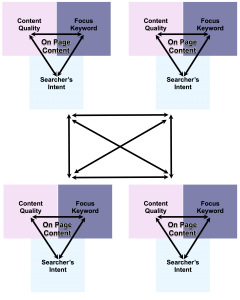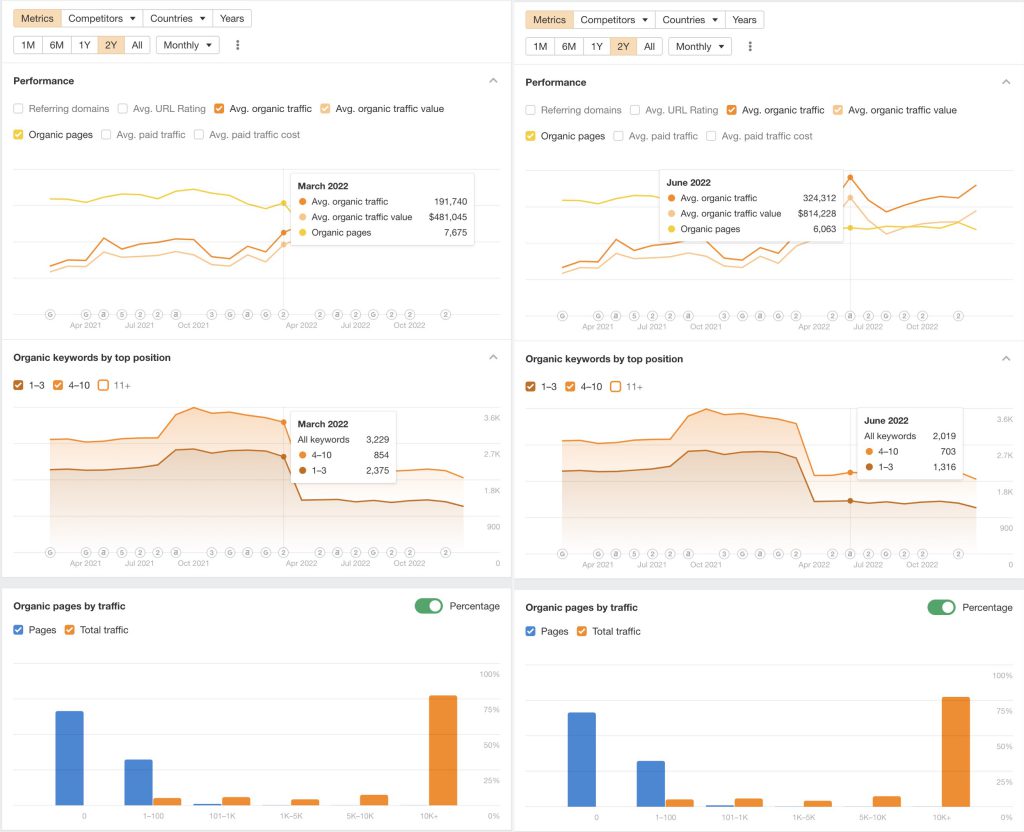If you’ve experienced the impact of keyword cannibalization on your business website. Then you know the frustration and fear that comes from having your site’s traffic, revenue, and leads dry up overnight.

Have you ever gone to a buffet when you’re very hungry? Not just hungry, but famished. Like you could start eating and never stop?
Starting to build content for your business online is like this.
You see opportunity everywhere and you grab whatever you can get your hands on. Shrimp, salad, chocolate cake. And then you look down at your plate and you have turkey gravy spread all over your green salad and chocolate cake.
And nothing looks appetizing anymore.
Getting started with an SEO strategy is a lot the same. You do some keyword research, you see the many opportunities for your business to rank, and then you create some content.
But much of your content isn’t all that different from the other content on your website. You create content that focuses on lot of similar content topics. From a searcher’s intent (and a search engine’s) perspective, you haven’t done enough to help them understand how the topic or content on each page differs from each other.
Your topics are competing for space on the plate, ie. cannibalizing each other. So you see why keyword cannibalization is a bit like going to the buffet when you’re hungry.
So what is keyword cannibalization?
Indulgence. Lack of planning. You’re hungry and ready to scarf down a mountain of food. Your hunger to rank ends up as a pile on your plate.
You’ve done keyword research on your website you understand that there’s opportunity. All these keywords showing market demand for your product or service. The opportunity to rank, drive leads, and make money.
It can be overwhelming to see opportunity right in front of you. So you take action without a game plan. And without a plan your effort ends up as duplication of content topics on your website.
Not great. Like walking into a buffet when you’re starving. You grab a plate and you load up. And then you’ve got a salad, steak, and chocolate cake situation on your hands. But everything ends up tasting like the turkey gravy.
Because you’ve loaded up too much of one thing. To the point where it crowds out the room you have on your plate for anything else. It’s a buffet — you can go back at anytime. But when you’re very hungry, strategy goes out the window.

And without a content development and keyword research process for your website, you spoil your plate. And the search engine gods don’t love that.
So what is keyword cannibalization anyways?
It’s all about topics or the keywords you target and create content for are too similar or related at the topic/keyword level. to stand on their own. Each article you’ve created is only a slight shade of gray different from the other.
Because you identify a group of related keywords, you see each has different level of demand. You think about how it would be great to rank for both keywords and how you can write each article to add value to the user. So rather than creating a single article that covers all four keywords. You create four near duplicate articles.
For example you run a tutoring business teaching kids to read after school.
So you create separate 4 articles when you really only need one:
- reading programs for kids
- reading programs
- online reading programs
- children’s reading programs
You can see we’ve loaded our plate with four separate keywords. But at the core they’re still very similar, after all, it’s just our business.
- How would we suggest to Google to rank these 4 pieces of content differently?
- Why do these 4 pieces of content exist on their own?
- Are some of your programs for kids and some for adults? (no, all your programs are for kids.)

Building a holistic focus keyword plan. And then develop content to meet searcher intent is the key to nipping keyword cannibalization in the bud.
You’re bound to a demand number. A computer is a machine. Nothing more. Nothing less.
You’re creating content because you’re relying on number from a computer to do your human judgement job for you. In the end we’re creating content for humans. You wouldn’t expect (or even want) a human to read your 4 different articles on the same topic, would you?
The search engines that crawl your website don’t know which article to promote. Because they’re all about the same topic. So search engines don’t rank any of the content you’ve spent time, energy, and often money creating. You’ve created your own keyword cannibal with four pieces of content about the same topic.
How do we identify keyword cannibalization and if we have it?
As your site gets bigger it can get very hard to know if you’ve written about a topic. And in a business you often have staff turnover, and writers come into and leave the business. On a site with 1000+ pages this can be a big problem.
The signs of Cannibalization:
- Your site loses a bunch of organic traffic overnight. This could be the sign you’ve been hit by a major Google penalty.
- Have you recently published a significant number of articles? You might have some cannibals in that group.
- The “wrong” URL on your website continually shows up for a specific search term.
- The Google dance for a URL never stops. There’s always some “dancing” when you publish new content. But if two or three URLs keep replacing others on your website for a specific group of search terms. Then you have cannibalization between these pages going on.
- You’ve written a high quality piece of content, and despite this it seems Google could give two shits less about your content.
Steps to take when you have keyword cannibalization:
Do a full content audit. While content audits are a pain in the ass, they’re necessary for good hygiene on your website. On a website that changes often, you should do them often regardless.
In your content audit you will need to compare all your:
- URLs
- Meta Titles
- H1s
- Site content
- Internal links
If you find that there is a high volume of duplication. There’s a process I prefer to run my website through. I call it Kill, Keep, Combine, Improve. To run this process you’ll need a tool that allows you to pull all the content from your website.
These are some handy keyword cannibalization tools:
- Ahrefs (great tool to identify the impact of keyword cannibalization)
- Screaming Frog (an essential tool for any website owner). Crawl your entire domain and put the export into a spreadsheet for analysis.
- SEMRush (has a dedicated cannibalization tool included, screenshot below. I’ve found it to be lacking in detail)
- Google Sheets — Here’s a free Cannibalization worksheet from Jeff Collins (a very good SEO). All you need is a Google Search Console account to use.
- Google Search Console (Necessary, for so many reasons)
Preventing Cannibalization in the first place
Avoid duplication:
Prevention is worth a pound of cure. Always document and keep track of your URLs and Focus Keywords. Keeping a repository of your content is more than a good idea, it’s essential. Not to mention has many other benefits like being able to identify great content to set up lifecycle nurture streams. You can use anything from a simple Google Sheet with all the topics and URLs to a complex table in Coda or Notion.
Become intimate with your content:
You must know if you’ve written about a topic before. This will prevent you from running into keyword cannibalization in the future.
Plus it will ensure you’re linking to your most important content as you create more and more articles on new topics. Internal link structures are important to the effectiveness of your SEO. And it also ensures visitors can find their way to the right answers.
What to do to fix keyword cannibalization?
- Play Keep, Kill, Merge, Improve. Document anything you should KEEP (Leave it alone it’s great content, rare). KILL (low value or negative value deleted, nuke it 404, 410). MERGE (fold the content into another similar URL). Improve (good topic, but the content has flaws or is in dire need of updating, most of your content).
- Any low value URLs you plan to KILL should be 404’d (not found), or better 410’d (No longer available on this server, nuked)
- Merged old URLs should be 301 redirected to the asset you plan to keep. This ensures you pass any accumulated value the URL has or backlinks to the new URL. The old URL will fall from Google’s index like it never existed.
- Improved URLs should be given a facelift. Add better content. New sections, new internal links, new optimized images with ALT text. Make the UI better for the reader.
In the end you should get a sense of accomplishment if you take care of you cannibals on your website. And now the right URL is ranking for the keywords you intend for it to rank for.
Case Study: The Outcomes of Fixing Cannibalization on Your Website
The outcome of getting rid of keyword cannibalization? Let’s take a look at a case study.
Below you’ll see a famous educational website that does after school math and reading programs.
Comparing the March 2022 website to the website in June. You can see they deleted about 1,600 URLs of low value and cannibalizing content.
In all, they deleted 21% of their total content. In this period the total number of keywords the site ranked for drops from 3,229 to 2,019. On the surface, it seems they are going backward.
BUT during this period. Organic traffic increases from 192,000 organic sessions a month to 324,000 per month. That’s a 62% jump.
The value of the traffic increases from $481K to $814K a 69% increase. Not too shabby for deleting 21% of your total content.
That’s the power of taking care of your keyword cannibalization.
 Article Summary:
Article Summary:
Keyword cannibalization is a total pain. But it has to do with not being careful with your keyword research process and content plan.
Document everything, make sure you have a great way to account for all the content you have on your website. And which keywords you’re targeting with each piece of content.
Your memory is faulty, so make sure you have it written down somewhere.
